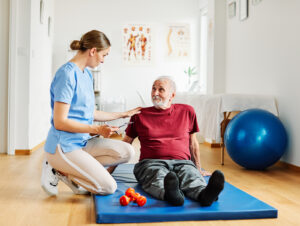
Senior Exercise: Assisted Living Fairhope AL
How do you exercise when it’s difficult just to walk around? When it’s challenging to get up from a chair? Or when you might trip and fall going from the bedroom to the bathroom in the middle of the night? Seniors may face a wide range of health challenges, and one of those involves safety risks.
Some people in their golden years of life stop doing physical activities. It might be following a heart attack or stroke. It could be after a slip and fall accident that resulted in injuries.
Well, exercise is critical for good health, including or especially for the heart, regardless of age. When an elderly person has mobility challenges, elder care can make a difference. The right elder care, like assisted living, can make all the difference in helping an aging senior get the exercise he or she needs to stay healthy, but do it in a safe way.
Let’s look at a few tips that might just help a senior in your life get the exercise he or she needs, even when they might have mobility challenges.
Use a Chair
If a person can’t stand for very long, no longer has the ability to walk on their own, then a chair is obviously important. They can still get valuable exercise even from a seated position.
There are many different exercises people can do in a chair. An experienced staff member at a quality assisted living community might be able to help that senior perform a wide range of tasks and get the exercise he or she needs from that seated position.
Take it Slow
No one said you had to do 100 push-ups or situps in five minutes. Nor do seniors have to do two or three or 10 miles of walking every day. Just a little bit of exercise at a time can be enough for an aging senior to get his or her leg muscles and heart muscles working.
Stretch Often
Whether the senior is mobile, exercises on their feet, or does it all from a chair, they should make sure they stretch as often as possible. Stretching helps limber up the muscles, relieve cramps, and keep them from causing harm to their muscles and joints.
They should rely on an experienced instructor if they want to know how to do proper stretches and how often they should do it. Even if the assisted living community doesn’t have an experienced fitness instructor on hand, the senior might be able to visit with one for a while, get in the habit of doing things properly, and then start working on them by themselves.
Have Assistance When Necessary
Not all seniors are going to require help to get exercise, but when they do, they should have the right support ready to help them on this journey. This doesn’t mean assisted living is going to provide physical support for exercises, but if they have the staff available, somebody to assist them, they should be able to rely on that at a designated time.
If the assisted living community doesn’t have a designated person to assist with exercises, the senior should look for somebody who can come to the facility or who has a gym and experience with seniors and start working with them directly.


Follow Us!